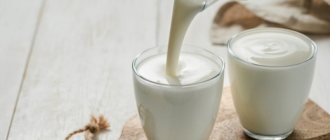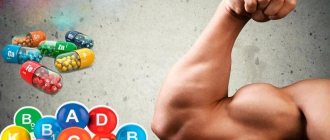coffee "
Many athletes - both professionals and amateurs - cannot resist a cup of strong aromatic coffee before or after training. This is understandable: after all, caffeine has a significant effect on both the physical and emotional state of a person, toning them up, increasing concentration, strength and endurance. However, it cannot be said that the effect of drinking a tonic drink during sports training can definitely be assessed as positive. The benefits or harms of an invigorating drink depend on several factors.
Benefits of coffee before exercise
Coffee contains more than a hundred different components, so its consumption affects the biochemical processes occurring in the body. The main effect is exerted by caffeine, an alkaloid found in coffee beans and a stimulant of the central nervous system. This is why drinking the flavored drink causes increased alertness—most people respond to caffeine with increased energy and improved mood.
Drinking just one cup of coffee blocks the production of adenosine, a neurotransmitter that suppresses alertness and promotes sleep. The brain reacts to this by releasing adrenaline and dopamine, which cause a surge of energy.
Under the influence of caffeine in the body:
- heart rate accelerates;
- blood vessels narrow;
- blood pressure rises;
- metabolism accelerates;
- the work of the muscular system is stimulated;
- increased activity and concentration.
In addition, the production of adrenaline accelerates the release of fatty acids into the blood. During physical activity, muscles will use them as a source of energy, preserving valuable glycogen reserves.
If you drink coffee before training, then during it your endurance will increase and your ability to withstand the load for a longer time.
It has been proven that caffeine, by stimulating the release of adrenaline, can increase muscle strength and enhance muscle contraction. The feeling of physical tension is reduced, allowing you to perform more repetitions of exercises or lift more weight.
Scientific studies have shown that two cups of coffee (470 ml) increases training efficiency and performance by 22%. Strength indicators increase by 10%.
Thus, drinking coffee before physical activity will significantly increase the effectiveness of your workout, since caffeine:
- dulls the feeling of fatigue and increases performance;
- allows you to withstand aerobic exercise for a longer time;
- relieves muscle pain during strength exercises;
- increases testosterone levels (this hormone helps athletes gain muscle mass);
- stimulates the central nervous system, increasing activity, concentration on exercise technique and reaction speed.
Increasing the intensity of the workout increases the load on the muscles, which stimulates the growth of muscle mass and accelerates the burning of fat reserves.
Overall, drinking coffee before a workout can lead to better performance in sports. It’s no wonder that caffeine is included in many pre-workout complexes, sports supplements and fat burners.
Useful tips for coffee-loving athletes
To avoid negative influences, lovers of sports and coffee drinks should adhere to a number of recommendations:
- Drink coffee after a workout in combination with fast carbohydrates. Thanks to this, you will be able to quickly restore energy reserves and strength.
- Drink enough fluids to avoid dehydration.
- Drink a maximum of three cups of espresso or Americano per day.
- Avoid drinking coffee drinks on an empty stomach.
- Drink coffee an hour before training and at least half an hour after its completion.
- To avoid addiction, take a break every couple of weeks - give up coffee drinks for several days.
Coffee is a very controversial product, capable of both benefit and harm. Positive effects are observed only when consumed in moderation. Excessive concentration of caffeine in the body will lead to numerous negative changes. Athletes are recommended to drink coffee before physical activity if they need to increase endurance to improve results. At the end of the workout, you should stop using it.
Harm and contraindications before training
Any stimulant can cause negative reactions from the body, especially when used in large doses. Individual intolerance to caffeine and allergic reactions may also occur. For some diseases, coffee is generally contraindicated, and drinking this generally healthy drink before training can cause unpredictable health consequences.
Do not consume caffeinated drinks or sports supplements before physical activity in the gym:
- with arterial hypertension;
- pregnant and lactating women;
- with increased nervous excitability;
- for stomach and duodenal ulcers and gastritis with high acidity;
- for severe vision pathologies, glaucoma.
People over 50 years old or with cardiovascular diseases should also abstain from the aromatic drink before training. In any case, the possibility of its use should be discussed with your doctor.
But even healthy athletes need to take into account that drinking coffee has side effects and can lead to adverse health consequences.
- When consumed on an empty stomach, it causes irritation of the gastric mucosa and can provoke the development of gastritis and ulcers, since caffeine increases the secretion of gastric juice.
- It negatively affects blood flow in the vessels, placing additional stress on the heart, and reduces the supply of oxygen to the organs.
- Causes a mild diuretic effect (acts as a diuretic). If there is a lack of fluid in the body, it leads to a disruption in the water-salt balance and increases the load on the kidneys.
- In women, it can lead to the formation of benign tumors in the mammary glands (mastopathy).
- Stimulates the intestinal muscles and acts as a mild laxative. Sometimes causes colic, diarrhea, and indigestion.
- Affects the absorption of drugs - reduces or, conversely, increases the absorption of some drugs.
- Increases anxiety and may cause depression.
Caffeine, as a stimulant, is addictive and addictive. To get an invigorating effect, you have to increase the amount of coffee consumed, which entails a number of negative health consequences.
Once the body gets used to caffeine, drinking a drink before playing sports will no longer increase performance and invigorate. Moreover, it can lead to rapid depletion of energy and cause a feeling of fatigue.
The dangers of caffeine before exercise
If even one small cup of coffee causes your heart to react too violently, drinking coffee before a workout is definitely not worth it, and in general you should think about consuming this drink. Maybe try switching to strong black tea?
Caffeine addiction is talked about in the same way as nicotine addiction. Of course, the harm is incomparably less, but the strength of the habit is approximately equal. Try not to give a coffee addict his favorite drink in the morning, and you will see how dependent a person becomes on this stimulant. In addition, as in the example with smokers, coffee lovers tend to increase the dose of the drink consumed over time, which clearly has a negative effect on the functioning of the heart.
In 2006, a specialized cardiology journal published material in which Swiss scientists stated that 250 mg of caffeine can significantly reduce blood flow to the heart during and after exercise. To function healthily during physical activity, your body requires a significant amount of oxygen and nutrients, so the heart experiences enormous stress, quickly pumping a large volume of blood. And drinking two cups of coffee reduces post-workout blood flow by 25%!
Moreover, these indicators turned out to be higher, the higher the altitude the experimental chamber simulated, about 40% for an altitude of 4000 m! If you live high above sea level or just climb regularly, be careful with your coffee.
In addition, coffee can cause an imbalance in water balance, which is especially important during and after training. This drink slows down the absorption of fluid from the intestines, which leads to dehydration and gastrointestinal disorders.
And with concentration, skeptics say, not everything is so rosy. Caffeine can stimulate brain function before exercise. You feel powerful and practically omnipotent, while you're just nervous and a little more focused. Whether to consider this a disadvantage is up to you to decide. For example, if you have a chess championship coming up, a cup of coffee will not be superfluous, but if you have a powerlifting triathlon ahead, we recommend weighing the pros and cons.
Why was this article written if everyone loves coffee so much? We also love its divine aroma and rich taste, but we advise you to think about what effect caffeine before a bodybuilding workout has on your body. Our common main goal is to create the perfect physique, and we sincerely wish you to remove all the barriers that prevent you from achieving this. And with problems providing cells with blood and nutrients during training, you will not only not get the desired result, but also cause significant damage to your heart.
How and how much can you drink coffee before training?
To ensure that drinking coffee before a workout has only a positive effect on the body and does not cause side effects, it is important to know how and how much it is recommended to drink it.
According to WHO recommendations, you can drink 300-500 mg of caffeine during the day without harm to your health. The norm is 3-5 mg/kg of weight. Depending on the type of coffee and the degree of roasting, one mug of this invigorating drink contains 80-120 mg of caffeine. This means that you can drink no more than 3 cups per day without fear of negative health consequences.
But the optimal doses of caffeine largely depend on the individual characteristics of the person and the frequency of consumption of the invigorating drink. When taken daily, even 400 g of caffeine is tolerated by the body almost unnoticeably. Some people, after drinking just one mug of coffee, experience symptoms of an overdose (rapid heartbeat, dizziness, high blood pressure).
In order for drinking an aromatic drink before fitness to have a stimulating and fat-burning effect, you need to drink 1-2 mugs 40 minutes before physical activity. At this dosage, it is safe for the nervous and cardiovascular systems and does not have a pronounced diuretic effect. You should drink coffee without sugar and cream - then it will contain a minimum of calories and have the desired effect on the body.
If you take it immediately before training in the gym, the drink will not have time to act - caffeine reaches its maximum concentration in the blood 40-50 minutes after consumption.
To increase the effectiveness of training and quick recovery, it is recommended to drink natural coffee, prepared in a coffee machine or brewed in a Turkish coffee machine. It is better to avoid instant drinks.
Frequent consumption of coffee in large doses (more than four mugs daily) negatively affects the body:
- Tolerance (addiction) to caffeine quickly sets in;
- signs of nervous system exhaustion appear (irritability, insomnia, causeless anxiety, depression);
- performance decreases;
- the risk of heart attack, stroke and early death increases (4 times);
- urinary incontinence may occur;
- the risk of developing gout increases.
To prevent addiction and reduce the effect of drinking coffee before training, you should drink it no more than twice a week. It is advisable to take a ten-day break after a month of regular consumption of the drink.
How much coffee can an athlete drink?
Coffee is a controversial source of energy that brings many benefits, but also causes damage to the body. Whether to use it or not is the decision of each athlete. If a referral has been made to use a stimulant, then for a person of average build and weight (80–90 kg) you need to take about 400 mg of caffeine. In terms of the number of cups of coffee, an athlete should drink 3-4 cups.
If a person does not play sports, then you need to drink no more than 2 cups per day.
Is it possible to drink coffee after a workout?
Drinking coffee after intense strength or cardio exercise is not recommended. Physical activity is already a kind of stress for the body, which reacts with the release of adrenaline. Drinking coffee immediately after it will cause additional stress on the heart and blood vessels.
After training, it is recommended to drink coffee only 30-40 minutes later. An invigorating drink will give you strength and energize you when you are weak after exhausting exercise.
There is another advantage to drinking coffee after exercise - caffeine helps to minimize pain due to sore throat and recover muscles faster (according to research, by 48%).
What is better coffee or caffeine tablets?
Instead of coffee, you can take 2-3 tablets of caffeine sodium benzoate to increase the effectiveness of your workout. One tablet contains 40 g of caffeine and 60 g of the excipient sodium benzoate, which enhances the solubility and absorption of the active component. This is the only caffeine-containing drug that is available in pharmacies without a prescription.
Scientific research has not yet revealed which source of caffeine is better: natural coffee or synthetic tablets. Each organism is individual, so only through experimentation can you find out which one has a greater stimulating effect and is right for you.
Caffeine tablets will be a real lifesaver for those who for some reason do not like drinking coffee, but want to increase muscle strength, endurance and lose weight faster.
Caffeine and its metabolism in the body
Caffeine (full name 1,3,7-trimethylxanthine) is a plant alkaloid with the chemical structure C8H10N4O2 and a molecular weight of 194.19. In its pure form it is a bitter white powder.
Caffeine easily enters the bloodstream through the mucous membrane of the mouth and stomach and is quickly absorbed (99% within 45 minutes). It is then metabolized by the liver and broken down into theophylline (5%), theobromine (10%) and paraxanthine (85%) [12]. From the liver, these substances travel throughout the body, where they affect various body functions:
- Theophylline has a stimulating effect on the central nervous system, myocardium and skeletal muscles, and causes relaxation of smooth muscles;
- Theobromine increases the amount of oxygen and nutrients that can be used by the brain and muscles;
- Paraxanthine leads to an increase in the amount of free fatty acids in the bloodstream [13], which can improve performance in all endurance sports. This compound also reduces inflammation and increases adrenaline levels in the blood. In addition, paraxanthine stimulates an increase in the concentration of calcium ions in muscles [14].
The rate at which caffeine is metabolized depends on specific genes. Research continues to uncover gene variations that appear to control how long caffeine can stay in the bloodstream. People with a certain PDSS2 gene change metabolize caffeine more slowly than others, so they need less coffee to feel the stimulant effect.
Coffee before exercise for weight loss
Recent studies confirm that drinking coffee in combination with exercise helps you lose weight faster. Caffeine speeds up metabolism and has fat-burning properties: it promotes the release of fatty acids from adipose tissue into the blood, which is then oxidized in the muscles during exercise. In addition, it regulates blood sugar levels, improves insulin sensitivity and reduces hunger.
To lose weight, you need to drink 1-2 cups of a freshly brewed drink without sugar and cream (you can add a little milk) 30 minutes before cardio or strength training.
Harvard scientists have found that green coffee promotes weight loss to a greater extent than black coffee. The average weight loss in the subjects over 3 months was 5.5 and 3 kg, respectively.
What can replace coffee?
Coffee is a rich, but not the only source of caffeine. This substance is contained in considerable quantities:
- energy drinks – up to 100 mg per 150 ml;
- in tea leaves – 60 mg per cup of black tea and 75 g of green;
- Coca-Cola – 40 mg.
Most thermogenic sports supplements also contain caffeine. There is even protein-enriched coffee (Protein Coffee from Scitec Nutrition) for making a nutritional shake for bodybuilders. One dose of the drink contains 27 g of protein and 100 mg of caffeine.
In addition to coffee to increase endurance and muscle strength, you can consume caffeinated sports nutrition and energy drinks before strength training to gain muscle mass. To lose weight, instead of coffee, it is better to drink a cup of strong tea before physical activity.
How much coffee can you drink for optimal effect?
Athletes, especially professional ones, always closely monitor their health. They need high levels of strength and endurance of the body, which are unattainable without proper nutrition. Therefore, questions about how much and what to consume for health benefits come first for them. This also applies to coffee.
The information that can be found regarding the recommended daily intake varies greatly from one source to another. Some believe (citing scientific studies) that drinking more than one cup per day is already harmful to health. Others, also using the data of scientists, boldly declare that it is normal to drink 2-3 cups of strong coffee a day; they certainly will not cause harm, but only benefit. In general, everyone says that it is acceptable to drink up to 6 cups a day.
According to testing results, the maximum effect of caffeine on performance is achieved at doses of 200 to 250 mg. As the dose increases, the effect no longer increases.
Given the lack of an exact opinion, each person needs to be guided by his own well-being. If there are signs of so-called “caffeine poisoning” (increased heart rate, anxiety and panic, insomnia, severe mood swings), this is a sign that the amount of coffee you drink should be reduced. In general, experts are inclined to believe that at one time the human body can receive 100-200 mg of caffeine, which is contained in approximately 3 teaspoons of ground or 2 soluble, without causing harm to health. You can drink no more than three of these servings per day.
One cup of espresso contains 80-100 mg of caffeine, Americano - 80-135 mg, cappuccino - 70-80 mg, instant - 65-100 mg. According to the American Soft Drink Association. At the same time, natural coffee is healthier for the body than instant coffee, which uses chemical additives.
Myths about coffee
Due to the popularity of coffee and its ambiguous effect on the body, people have many different myths about this drink. Recent scientific research has refuted most of them.
Myth No. 1. Coffee causes drug addiction
The legend that coffee is very difficult to give up does not stand up to criticism. An attachment to the drug certainly arises, but it cannot be called an addiction. If you gradually reduce the dose of caffeine, bringing the consumption to several sips a day, then the body will get used to it, and giving up your favorite drink completely will not be difficult. There will be no withdrawal or breakdowns in the future.
Myth No. 2. Drinking caffeinated drinks disrupts your sleep.
Insomnia from drinking coffee can occur if you drink 2-3 cups of strong drink at night (3-4 hours before going to bed). Drinking coffee in the morning or before an afternoon workout at the gym will not affect your sleep in any way.
Myth No. 3. Instant coffee is harmful
Instant coffee drink lacks almost all beneficial substances and contains much less caffeine than freshly brewed natural coffee. It will not provide much health benefit and will not significantly improve the effectiveness of your workout if you drink it half an hour before it. But we cannot talk about any harm to the body.
Myth No. 4. Coffee provokes the development of osteoporosis
Excessive amounts of caffeine can actually cause calcium to drain from your bones. But this amount can easily be compensated by drinking only 2-3 tablespoons of milk. So, drinking coffee with milk reduces the risk of osteoporosis.
Myth No. 5. Coffee greatly increases blood pressure.
In fact, with regular coffee consumption, the blood pressure monitor readings do not change at all. The pressure may increase by 10-20 mmHg. in the next 1-2 hours after taking it only if you drink the aromatic drink no more than 1-2 times a month or after a long break.
Thus, most myths are fiction, and scientific research does not support them with facts or refute them completely. What has actually been proven by scientists is that caffeine, when consumed in the right dosages and at the right time, helps increase the effectiveness of sports or fitness, gain muscle mass or lose weight faster.
You cannot consider the drink magical and completely rely on it alone - drinking coffee without following the rules of nutrition and physical activity will not affect your figure.
Caffeine. Benefits and harms
Since its inception, coffee has been surrounded by many myths and legends, some of which relate directly to its influence on our body.
Coffee owes its invigorating effect to the high caffeine content in its composition. Caffeine is a major nervous system stimulant found in tea, some nuts, cocoa and mostly coffee beans. We have all heard about the effect of caffeine on the body more than once, and even more so have experienced it ourselves:
- Caffeine reduces drowsiness;
- increases reaction speed;
- improves mood;
- stimulates brain activity;
- has a positive effect on the production of hormones responsible for feelings of happiness and well-being.
And although more and more scientific research and data on this topic come out every year, many scientists and doctors still argue about the dangers and benefits of coffee and caffeine for our body.
On the one hand, coffee is great for invigorating, but on the other hand, does a person involved in running, fitness or strength training really need this extra energy? After all, the training process itself perfectly stimulates the nervous system.
Let's look at this question in more detail for each individual case!











